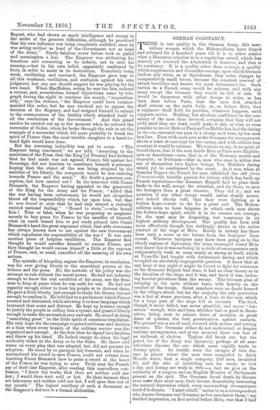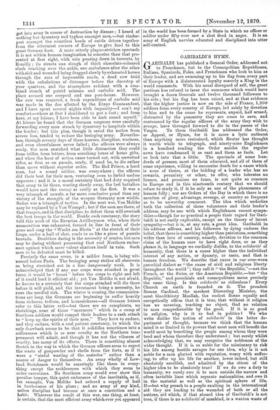GERMAN CONSTANCY.
THERE is one quality in this German Army, this mar- vellous weapon which the Hohenzollerns have forged and reforged for a hundred years till it is to other armies what a Damascus scimitar is to a regulation sword, which has scarcely yet received the admiration it deserves, and that is its constancy. It is a quality other than courage, a quality which supplements and intensifies courage, upon which German leaders rely when, as at Speicheren, they order charges by comparatively small forces, because the constant renewal of attack bewilders and daunts the most determined foe. Such tactics in a French army would be ruinous, and with any army except the German they would be full of risk. It would be dangerous with other troops to order, as has been done before Paris, that the men first attacked shall retreat on the main body, or, as before Metz, that a regiment shall hold its position, whatever happens, until supports arrive. Nothing but absolute confidence in the con- stancy of the men thus devoted, certainty that they will not yield until they are dead, could make it safe, or wise, or even possible to invest Metz or Paris as Von Moltke has had the daring to do--to surround ten men in a clump, as it were, by ten men in a line. Even with such men as the Germans the arrangement shows a trace of contempt for the enemy, and with soldiers less constant it would be ruinous. We venture to say, in no spirit of boastfulness, that if the men inside Metz or Paris were English- men or Americans—men, that is, of the Teutonic merits and demerits ; or Irishmen—that is, men who once in action rise out of themselves into higher beings, Von Moltke's daring would yet be condemned by the event. As it was, when at Grandes Tappes the French for once exhibited the old furia Francese—the terrible passion for victory which has built up French reputation—the Kummer Brigade had to place their backs to the wall, accept the situation, and die there, to save the besiegers from a great disaster. They did it ; and we question if any other troops would, unless clearly aware, and indeed clearly told, that they were fighting as a forlorn hope,—were to die for a great end. The Hohen- zollerns seem to have brigades in which each man shows the forlorn-hope spirit, which is in its essence not courage, for the man may be despairing, but constancy in its highest military development. The quality has been still more effectively though less strikingly shown in the entire conduct of the siege of Metz. Rarely in history has there been such a scene as the letters from the besiegers' lines reveal. Whatever intrigues may have been going on in the cloudy regions of diplomacy, the army encamped round Metz only knew that it was enclosing by a circle of encampments each comparatively weak an army nearly as strong as itself, which at Vionville had fought with determined daring, and which occupied an absolutely impregnable position. It knew that at any hour of any night it might be forced to fight for existence as the Kummer Brigade had done, it had no clear theory as to the duration of the siege, and it was, and knew it was, endur- ing heavier privations than the enemy. The German plan of camping in the open, without tents, tells heavily on the comfort of the troops. Great numbers were no doubt housed in the villages about, but for the majority the only protection was a hut of straw, pervious, after a time, to the rain, which for a large part of the siege fell in torrents. The food, though it never failed, was never plentiful, and never " lux- urious " enough, wine and beer, whether bad or good in them- selves, being, next to minute doses of morphia or great doses of quinine, the best preservatives against malaria. The ground was a sea of mud, covered with ordure and rotting carcases. The Germans either do not understand or despise sanitary arrangements, and at one moment there was fear of an outbreak of cholera. Typhus did break out, but the grand foe of the Army was dysentery, perhaps of all non- infectious diseases the one which most rapidly tends to destroy spirit. So terrific were the ravages of this dis- ease in places where the men were compelled to drink Moselle water, that a single company, 250 men, invalided 80, and the rate of invaliding rose for weeks to 500
a day, and during one week to 800,—a fact we give on the authority of a surgeon and an English Member of Parliament present on the spot. The Germans dread death by disease even more than most men, their intense domesticity increasing
the natural depression which every surrounding circumstance tended to deepen. "I must admit," writes to us a correspondent who knows Germans and Germany as few men know them," my decided impression, on first arrival before Metz, was that I had
got into army in course of destruction by disease ; I heard of nothing but dysentery and typhus amongst men,—but rinder- pest amongst the countless herds of cattle driven together from the uttermost corners of Europe to give food to this great German host. A more utterly plague-stricken spectacle it is not within human imagination to conceive than that pre- sented at first sight, with rain pouring down in torrents, by Remilly ; its streets one slough of thick chocolate-coloured slush reaching over the ankle, one ambulance after the other with sick and wounded being dragged slowly by exhausted horses through the ruts of impassable roads, a dead cow fetid with the exhalations of distemper before the doorstep of your quarters, and the atmosphere redolent with a com- bined stench of putrid miasma and carbolic acid. The place seemed one cesspool and one pest-house. However, the cow was removed, a fresh expenditure of carbolic acid was made in the den allotted by the E tape Commandant, and I have spent several nights with impunity—I can't say comfort—where at first I shuddered to put a foot ; and from here, at my leisure, I have been able to look round myself." At leisure he found that the German surgeons were carefully forwarding every man struck by dysentery to hospitals within the border ; but this plan, though it saved the nation from severe loss, tended to reduce the besieging army. Neverthe- less, through seventy days of these horrors, discipline, wariness, and even cheerfulness never failed ; the officers were always ready, the men snatched what little distraction they could from trifles, from letters, from searching boxes of home gifts, and when the hour of action came turned out, with unwetted rifles, as firm as on parade, ready, if need be, to die rather than move without superior order. The Red Prince, a hard man, but a sound soldier, was everywhere ; the officers did their best for their men, venturing even to forbid useless exposure ; and it is a moral certainty that had duty required that army to lie there, wasting slowly away, the last battalion would have met the enemy as coolly as the first. It was a very triumph of morale, a far more conclusive proof than any victory of the strength of the weapon Germany now wields. Sedan was a triumph of tactics. In the next war, Von Moltke may be replaced by a Von Wrangel ; but if the men are there, of that temper, and in that discipline, to defeat them will overtask the best troops in the world. Beside such constancy, the story told this week of the Bavarian Artillerymen who, when their ammunition was exhausted, formed in line in front of their guns and sang the " Wacht am Rhein" at the stretch of their lungs, under a hail of shot, reads to us like a piece of puerile bravado. Doubtless daring is the necessity of armies, but men may be daring without possessing that cool Northern endur- ance against which mere valour shatters itself in vain. Such men to be defeated must be killed.
Precisely the same scene, in a milder form, is being wit- nessed before Paris. The besieging army strikes all observers as being stretched out in a line dangerously weak. It is acknowledged that if any one corps were attacked in great force, it would be " hours " before the corps to right and left of it could lend it efficient aid ; yet Von Moltke is not afraid, he knows to a certainty that the corps attacked will die there before it will yield, and the investment being a necessity, he runs the needful risk. The winter is coming, the communica- tions are long, the Germans are beginning to suffer heavily from sickness, tedium, and homesickness—all German letters refer to this latter evil—but there are no complaints, no shrinkings, none of those "murmurs" which in a camp of Southern soldiers would compel their leaders to a rash attack to "keep up the spirits of their men." They have to endure, and they endure, with a cool patient constancy, to which the only drawback seems to be that it solidifies sometimes into a callousness which is as near cruelty as the Northern tem- perament will admit, and though it has not the vileness of cruelty, has many of its effects. There is something almost Scotch in the way in which the German officers seem to regret the waste of gunpowder and shells from the forts, as if it were a "sinful wasting of the maircies " rather than a source of danger to themselves. An army wholly of Low- land Scotchmen would be amazingly like them in every- thing except the recklessness with which they seem to order executions. No Southern army would ever show this peculiar temper, this quiet endurance of the inevitable, as if, for example, Von Moltke had ordered a supply of hail in furtherance of his plans ; and no army of any kind, unless discipline had become at once a conviction and a habit. Whatever the result of this war, one thing, at least, is certain, that the most efficient army which ever yet appeared in the world has been formed by a State in which no officer or soldier under fifty ever saw a shot fired in anger. It is an army of English navvies educated and disciplined into utter self-control.



































 Previous page
Previous page